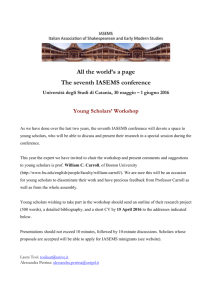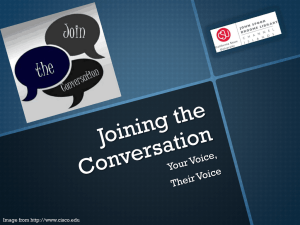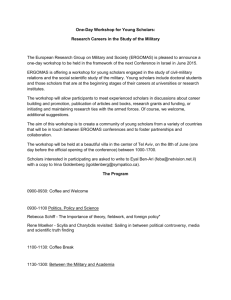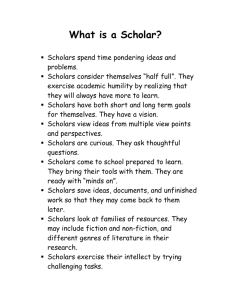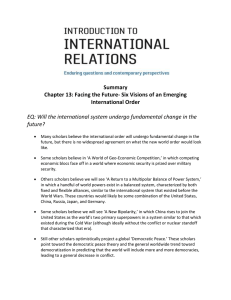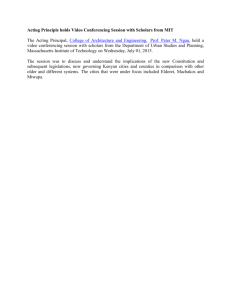Class of 2012 begins academic journey on Thompson Island
advertisement
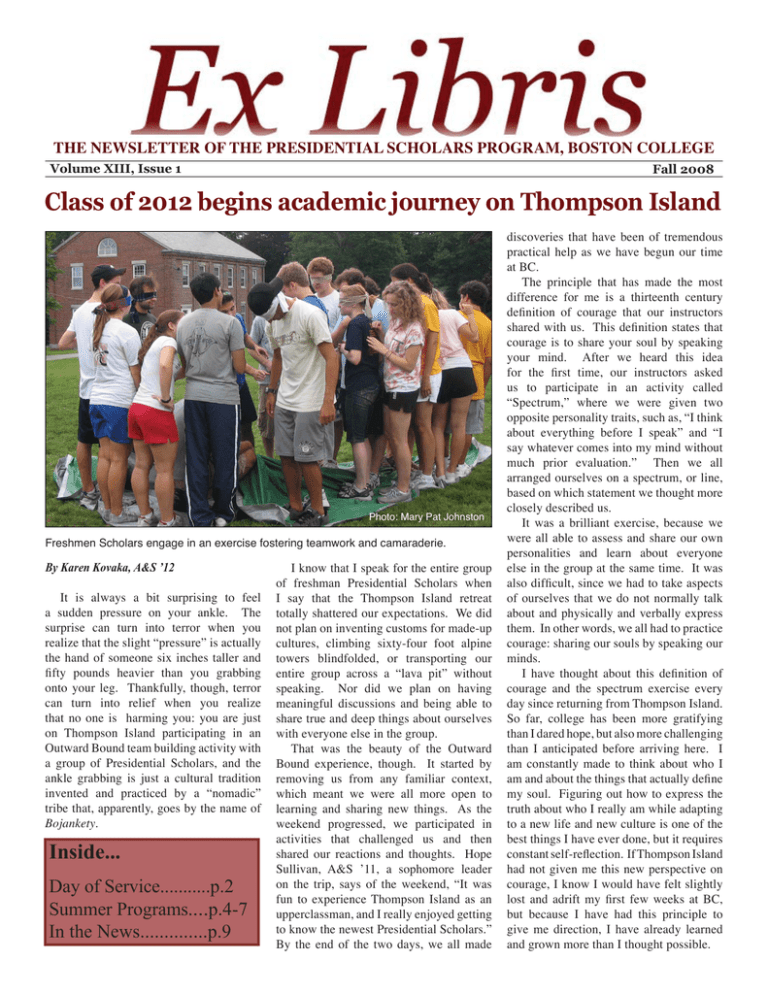
THE NEWSLETTER OF THE PRESIDENTIAL SCHOLARS PROGRAM, BOSTON COLLEGE Volume XIII, Issue 1 Fall 2008 Class of 2012 begins academic journey on Thompson Island Photo: Mary Pat Johnston Freshmen Scholars engage in an exercise fostering teamwork and camaraderie. By Karen Kovaka, A&S ’12 It is always a bit surprising to feel a sudden pressure on your ankle. The surprise can turn into terror when you realize that the slight “pressure” is actually the hand of someone six inches taller and fifty pounds heavier than you grabbing onto your leg. Thankfully, though, terror can turn into relief when you realize that no one is harming you: you are just on Thompson Island participating in an Outward Bound team building activity with a group of Presidential Scholars, and the ankle grabbing is just a cultural tradition invented and practiced by a “nomadic” tribe that, apparently, goes by the name of Bojankety. Inside... Day of Service...........p.2 Summer Programs....p.4-7 In the News..............p.9 I know that I speak for the entire group of freshman Presidential Scholars when I say that the Thompson Island retreat totally shattered our expectations. We did not plan on inventing customs for made-up cultures, climbing sixty-four foot alpine towers blindfolded, or transporting our entire group across a “lava pit” without speaking. Nor did we plan on having meaningful discussions and being able to share true and deep things about ourselves with everyone else in the group. That was the beauty of the Outward Bound experience, though. It started by removing us from any familiar context, which meant we were all more open to learning and sharing new things. As the weekend progressed, we participated in activities that challenged us and then shared our reactions and thoughts. Hope Sullivan, A&S ’11, a sophomore leader on the trip, says of the weekend, “It was fun to experience Thompson Island as an upperclassman, and I really enjoyed getting to know the newest Presidential Scholars.” By the end of the two days, we all made discoveries that have been of tremendous practical help as we have begun our time at BC. The principle that has made the most difference for me is a thirteenth century definition of courage that our instructors shared with us. This definition states that courage is to share your soul by speaking your mind. After we heard this idea for the first time, our instructors asked us to participate in an activity called “Spectrum,” where we were given two opposite personality traits, such as, “I think about everything before I speak” and “I say whatever comes into my mind without much prior evaluation.” Then we all arranged ourselves on a spectrum, or line, based on which statement we thought more closely described us. It was a brilliant exercise, because we were all able to assess and share our own personalities and learn about everyone else in the group at the same time. It was also difficult, since we had to take aspects of ourselves that we do not normally talk about and physically and verbally express them. In other words, we all had to practice courage: sharing our souls by speaking our minds. I have thought about this definition of courage and the spectrum exercise every day since returning from Thompson Island. So far, college has been more gratifying than I dared hope, but also more challenging than I anticipated before arriving here. I am constantly made to think about who I am and about the things that actually define my soul. Figuring out how to express the truth about who I really am while adapting to a new life and new culture is one of the best things I have ever done, but it requires constant self-reflection. If Thompson Island had not given me this new perspective on courage, I know I would have felt slightly lost and adrift my first few weeks at BC, but because I have had this principle to give me direction, I have already learned and grown more than I thought possible. Annual Day of Service at Cradles to Crayons Photo: Mary Pat Johnston Karen Kovaka, A&S ’12, Sarah Collier, A&S ’12, Lea Yared, CSOM ’10, Tim Mooney, A&S ’09, and Jessica Seminelli, A&S ’12 enthusiastically sort through books reminiscent of their youths. By Aleksandra Jachtorowicz, A&S ’12 Unlike cans of corn or boxes of granola, each toy at Cradles to Crayons, this year’s charity for the annual Presidential Scholar Day of Service, held the promise of countless smiles to come. Meeting on the bright morning of September 13, greeted by a savory breakfast of bagels and cream cheese, it’s dubious the Scholars expected to spend the next few hours doodling on wrapping paper and playing with blocks – but that’s exactly what happened. Cradles to Crayons (C2C), whose mission is to “provide, free of charge, low-income and homeless children from birth to pre-teen the basic essentials they need to be safe, warm, ready to learn, and valued,” gives out only the highest quality items from among the vast amount of donations they receive from clothing and toy drives. Every picture book, train track, and Tickle-Me Elmo passes through an arduous inspection process before even being considered for redistribution. Before the Scholars could sift through boxes of pretty ponies and action figures, however, they were seated at a long table covered by sheets of brown paper and instructed to transform them into works of birthday art – personalized wrapping paper. C2C also allows contributors to “share” their birthday with a child by having guests donate supplies instead of buying presents. The brown sheets were soon filled with birthday wishes in different languages interspersed with pirate ships and rock bands; flowers, giraffes, and fish spilled into each other among abstract, geometrical blooms of color and smiling people holding hands. Next, the volunteers were split into task forces: one to sort books, one to sort toys, and one “brute squad” to unload donations from a recent drive. “We were told to sort books by reading level: preschool to first grade, first to third, third to fifth, and higher,” describes Sarah Collier, A&S ’12. “It really brought me back,” she continues, “The other Scholars and I compared our favorite childhood books as we sorted; it was the perfect way to get to know some of the older years.” Nick Ackerman, A&S ’09, agrees, “The Day of Service was a great opportunity to interact with the freshmen while doing some good. Plus, I got to lug heavy boxes onto a conveyer belt – what could be better?” Meanwhile, the toy-sorters were fast at work as well. Tue Tran, A&S ’11, lost 2 no time, jumping into a near-empty crate to make sure every last play-thing was considered. Caroline Beyer, A&S ’12, and Abby Letak, A&S ’12, collaborated on restoring a 40+ piece train set to working order, carefully cleaning each section of track. Kyle Marra, A&S ’12, was soon engrossed in a miniature masonry set, complete with mix-your-own mortar, half-inch bricks, and a tiny trowel. “You can build an actual house!” he exclaimed. Indeed, many Scholars could be seen eagerly packaging the toys they had just spent time restoring and playing with, pleased by the fact that some fortunate child might enjoy the item even more than they had. The day was rounded out by a barbeque back at Lawrence House, where lively discussions of favorite childhood games mixed with advice exchanged between Scholars concerning majors, professors, and volunteer opportunities, all in between bites of chicken and cornbread. Many of the Scholars said they would be happy to return to Cradles to Crayons on their own time, and their eagerness was hard to miss – as the barbeque dispersed, they lingered, their expressions nostalgic, unwilling to put an end to 2008’s Day of Service. Scholars meet Watertown Peer Leaders By Tue Tran, A&S ’l1 Service is a pillar of the Presidential Scholars Program as well as an essential element of the Jesuit tradition of service, which is why the Program includes a summer of service after freshman year. This summer, in addition to the two placements at which the rising sophomore Scholars volunteered, included a new event that took place on June 4th. Student leaders of the Watertown Youth Coalition (WYC), an organization committed to fostering healthy lifestyles among the youth of Watertown, joined the Scholars at Boston College for an evening of fun activities, pizza, and advice on how to prepare for college as a high school student. The evening started with a scavenger hunt around the campus. The participants were divided into three groups consisting of both WYC student leaders and Scholars. They were asked to take pictures of their groups in front of various items or places, such as a dorm room or academic building. The hunt brought out the competitive nature of the participants when the teams raced back to Lawrence House, since finishing first played a role in the outcome of the competition. After much gasping for air and consuming pizza, it was announced that Team #2 had won and that each member would receive a $5 gift card to Dunkin’ Donuts. “I’m very proud of the collective effort,” said Collen Maher, A&S ’11, holding up her prize. In addition to the scavenger hunt, the night had the larger goals of welcoming the student leaders to BC and advising them on what to do in preparation for college. Chris Griesedeick A&S ’11, described it best: “We spent a lot of time explaining to them about college and BC. I also acted as a tour guide throughout the scavenger hunt.” Over pizza and soda, friendly conversation about college took place. Katie Devaney, Co-Chairperson of the WYC and former graduate assistant for the PSP, spoke about the success of the night: “[The activity] was great, and hopefully, it will become an annual event.” Eddie Tai, a WYC student leader and rising sophomore in high school, put the night in simplest terms: “It was awesome.” Photo: Mary Pat Johnston Brian Varian, CSOM ’11, Hope Sullivan, A&S ’11, Steve Liu, CSOM ’11, and Lindsey Hennawi, A&S ’11 with WYC Peer Leaders in O’Neil Library during the scavenger hunt. Photo: Mary Pat Johnston Dear Presidential Scholars and Staff Members: On behalf of the Watertown Youth Coalition, I am writing to thank you again for the absolutely wonderful time that you showed the WYC Peer Leaders when we visited campus on June 4th. The evening was a great opportunity for our students to learn about college life and interact with students who embody academic acheivement, leadership, and service to others. The Peer Leaders strive to make their community a better place for youth and families to live by addressing issues that affect youth such as intolerance, substance abuse, and social injustice. It was inspiring for us all to see that there are college students like the Presidential Scholars who use the talents and gifts that they have been given to help others. And we had a lot of fun in the process! Sincerely, Katie Devaney Co-Chairperson and Community Organizer The Watertown Youth Coalition Wayside Youth and Family Support Network 3 Class of 2011 Community Service Placements At the close of their freshman year, Scholars remain in Boston for six weeks to volunteer in various placements. This program allows students to get to know the local communities on a much more intimate level while serving populations that are often forgotten and overlooked by mainstream society. The following is a reflection of one current sophomore. Freshman Scholars serve greater Boston area By Brian Varian, CSOM ’11 Over the course of my freshman year at Boston College, I had grown quite familiar with the city of Boston, a place I now rightfully regard as a second home. During that first year I availed myself of the many cultural and recreational opportunities that Boston has to offer. I traveled on the Green Line to the North End, Symphony Hall, Boston Common, the Prudential Center, and many other worthwhile destinations. I experienced a city steeped in history, resplendent with diversity, and thoroughly enraptured by progress. This past summer, I traveled on the Green Line to Haley House, not a typical destination for many Bostonians, but a worthwhile destination, nonetheless. At Haley House, I experienced the breadth of diversity in Boston, which assuredly extends to socio-economic diversity. Haley House, located in the South End of Boston, is a self-described “spiritually based community nurtured by the personalist tradition of the Catholic Worker Movement” that provides a wide array of programs for the community, including low income housing, soup kitchen, food pantry, bakery café, cooking lessons, elder meals, and more. For six weeks I was involved in the day-to-day operations of Haley House, working with the elderly, indigent, and neglected—the most vulnerable and voiceless members of society. This was a side of Boston that I had not yet seen, a side of Boston that some lifelong Bostonians had never seen. This was one component of the PSP Summer Service Program. This year, Scholars of the Class of 2011 served at a variety of placements: Haley House, Hampshire Educational Collaborative, The Italian Home for Children, The Labouré Center, Project Bread Foodsource Hotline, Rosie’s Place, Saint Francis House, and Suffolk County Correctional Facility. While the experiences of the Scholars varied according to their particular placements (each Scholar served at two placements), Scholars were asking many of the same questions over the course of the six-week program: “Are the poor entitled to a choice?” “How do people become homeless?” “What role do laws play in society?” In large part, these questions were facilitated by weekly seminars led by Professor David McMenamin, Director of Boston College’s Pulse Program. At the seminars, Scholars discussed selected readings that resonated with the service they had undertaken during the week. These readings were: The Death and Life of Great American Cities, by Jane Jacobs; Doing the Truth in Love, by Father Michael Himes; Development as Economic Freedom, by Nobel Laureate Amartya Sen, Discourses on Inequality, by Jean-Jacques Rousseau; The Working Poor, by David Shipler; and The Plague, by Albert Camus. Not only were the readings insightful in their own respect, they also provided some common ground as a basis for excellent discussions. Each week, Scholars wrote reflections on their service. For many, these reflections were quite personal and oftentimes remarkably revealing of our character and its development. Undeniably, the Summer Service Program awakened the emotions of every Scholar, but in very different ways. While some Scholars expressed feelings of sorrow, others communicated feelings of confusion, still others conveyed feelings of joy – joy in celebrating the dignity of every individual, regardless of circumstance. Yet, all Scholars were challenged personally and changed for the better by this experience. Now, when I travel on the Green Line, I know exactly what city it leads to. Source: www.italianhome.org The following is an excerpt from a reflection written by Tue Tran , A&S ’11 , a Communication major from Nebraska: “The overwhelming emotions I felt included powerlessness and guilt. The powerlessness comes from being unable to directly help the children at the Italian Home right now on a grander scale. While I’m enjoying reading and chatting with them, the issues they face are grave and intimidating. The guilt comes from understanding how lucky I am but still not being able to do much about their situation. I have come to understand that I shouldn’t feel guilty for having my own life to lead, as long as there is an internal vow of service that is both small and large when I have the opportunity. However, this is still difficult to swallow as I’m an impatient person, especially when I see a hungry, elderly man or a girl who, as she stated to me, has been working on her behavioral skills in hopes of being adopted.” 4 Class of 2010 France Study Experience This summer, Scholars spread out around the globe to explore other cultures, serve their fellow man, and build professional skills. Through the immersion trip to France, Scholars from the Class of 2010 continued their predecessors’ commitment to leadership, exploration, and service. Sophomores engage in foreign culture By Patrick Passarelli, A&S ’10 Though relatively brief, my four weeks in France with the Presidential Scholars Summer International Experience made my world simultaneously shrink and expand. Although I had studied the French language intermittently over a period of five years, visiting France allowed me to enter into a culture I had only experienced through staged textbook photographs, literary excerpts, gastronomical delights, and subtitled films. While it would be a stretch to say that I felt completely at home abroad, my French studies had piqued my curiosity enough to give each unique experience the feeling of long-anticipated completion, as if I were finally encountering something for which I had been preparing all along. It was easy enough to embrace the relaxed, so-called French style of life. There is no question we work-oriented Americans could learn a thing or two about sitting back and enjoying the pleasantries of life. I think of a discussion I had about the cultural significance of coffee, how in America people gulp down coffee for efficiency’s sake, while the French drink coffee for a relaxing, pleasurable break in their day. The comparison seems to extend to all areas of life, though especially in matters of food. After last summer’s excursion to Uganda to do AIDS research through an Advanced Study Grant, I could not have been more delighted to visit a foreign country with the standard luxuries of a developed nation, and the contrast between my two picture collections could not be more striking. High-rent Haussman-style apartments have replaced crumbling, ruststained storefronts, and the subjects of my amateur photography are now chicly dressed Europeans instead of crowds of curious school children. I page through my travel notebook and flip to an entry in my journal from the trip: Sunday, June 15, 2008, Paris: “As soon as we finished with class and discussion at the FIAP on Friday, I wolfed down a quick lunch and bolted for the Photo: Marjorie Sardella Scholars break from their busy schedule for a picture in front of Versailles. Denfert-Rochereau Metro stop with one place in mind. About a half hour later, the train rolled into the Louvre stop, and I followed a collection of people no doubt as eager as myself to enter the world’s most famous art museum. I was surprised to find myself in the annals of a massive, underground mall, but I successfully navigated the signs toward the actual museum. As I passed one of the inverted glass pyramids, images of Tom Hanks as Dr. Robert Langdon in the Da Vinci Code forced themselves into my mind. Part of the reason for coming here was to dispel Hollywood images of Paris such as these and to develop a distinct picture of the place for myself. And the reason I came to the Louvre alone was so I could do so quietly, introspectively, and at my own pace. I spent hours wandering through the vast galleries housing thousands of years of art and the history and culture underlying it: Grecian urns, Egyptian boat models, Mesopotamian sculptures, El Greco’s, the Mona Lisa … All impressive but secondary to the collection I cared most to see. My fellow Scholars, Sarah and Joe had already excitedly told me of their multiple trips to the Louvre to see the masterpieces we had studied in Professor 5 O’Connor’s [Western Cultural Traditions] seminar, and I had been mentally preparing myself to do the same for several weeks. The dramatist in me had put off my Louvre visit until now, in the hope that the moment would be as artistic as possible. After what seemed to be miles of Italian Renaissance paintings, I finally found myself in Gallery Number 59. Immediately, I spotted Ingres’s La Grande Odalisque, walked across the room to pour my eyes over David’s The Oath of the Horatii, and turned around to face Napoleon in all his coronation glory. I cannot fully explain the surge I felt pulsing through my brain and radiating out to the extremities of my body, but it had something to do with the knowledge that the world was not so big that I could not study a 19th century painting’s philosophical importance and then see it in person to experience the practical purpose of art – a profound, jawdropping sense of awe. I wish I had had Professor O’Connor beside me to see him roused to excitement as he was so often in class, feeding off his students’ enthusiasm. But I knew he would be glad that I had my own private moment to once again connect our work in the seminar to a personal life experience.” Class of 2009 Internships Each summer the rising senior Scholars complete internship experiences that challenge them to venture into private and non-profit organizations in order to apply the knowledge and leadership skills that they have cultivated over their three years at Boston College. Peacemaking in the Middle East Photo Courtesy of: Amy Kyleen Lute Amy Kyleen Lute, A&S ’09, with community activists in Palestine. By Amy Kyleen Lute, A&S ’09 For most Americans, the Middle East is a headline, a hijab, a terrorist. Jerusalem is an epicenter of spiritual experience and religious history, but it remains surreal to most Americans. Our exposure is, for the most part, limited to Sunday mornings of reading the New York Times and listening to the Gospel at church. Despite this limited exposure, we still hold some vague understanding that this mysterious place does actually exist somewhere outside our imaginations. This summer I was fortunate enough to live within Jerusalem and come to know its layered history and realities which allowed me to form my own perceptions. Fittingly, my initiation into this complex region was an intensely challenging seven-hour trip from Amman, Jordan – where I had been studying abroad – to the holy city. Five of the seven hours were spent being interrogated and herded through Israeli security checkpoints. Despite continually reminding myself that I was surrounded by people who had it worse, I still could not help but feel that this atmosphere was demeaning, emasculating and unjust. This was the first of many such experiences that I was to endure over the next seven weeks. The lessons that I learned and the experiences that I had gave me unique insight into the infinitely-complex situation in which I was immersed and also shed new light on my abilities, interests, and passions. By choosing to intern in Jerusalem, I ensured that I would be challenged not only at my placement, but in every minute of every day. These challenges came in many different forms: speaking Arabic, adjusting to new cultures and value systems, constantly being exposed to opposing opinions and beliefs and attempting to give every person and perspective equal weight. I was an object of potential, power, sex, healing, hatred and admiration. My situation mandated that I be at all times mindful of my actions, words and appearance. As soon as I arrived I was given tasks and contacts, and fit securely into a community of non-government 6 organizations (NGO’s) and foreign intervention that was more extensive than I ever imagined. I was working for Middle East Nonviolence and Democracy, an NGO that promotes a culture of nonviolence in Palestinian communities. Through the framework of an Active Nonviolence Network, regional coordinators work to educate and empower their communities with training, workshops, seminars and summer camps. The organization relies heavily on these local community organizers and activists as well as on media and educational campaigns to create a respected alternative to violent struggle against the occupation. While I was there, I facilitated and translated seminars and interviews. I was present during conferences and conversations between people who have devoted their lives to ending an oppression that does not directly affect them beyond their own empathy and guilt. I was introduced to an entanglement of goodintentioned, international community organizers who attempt to impose their ideas onto a suffering population without once asking the people themselves what should be done. It afforded me an opportunity to see reality in a conflict that is drastically distorted and misrepresented. I was privy to the trust and honesty of so many Palestinian people who shared their stories, homes, traumas and dreams with me. I came to see Jerusalem in its broken and layered reality. I observed with interest the inner workings of grassroots organizations and the inefficient, laborious funding circus. I was frustrated by both the lack of accountability in these organizations and the waste of precious resources. From these unexpected outcomes and lessons, I emerged – alhamd ila alah, thanks be to God – with a cracked and jostled foundation, but also with fire inside of me to question, learn, and discern. My experiences these past two months have helped me begin to chip away at the uncertainty of my future by further defining my passions and direction. A summer down under Photo Courtesy of: Pilar Landon Pilar Landon, A&S ’09, pulls a raft full of rotting sea grass during her hands-on internship. By Pilar Landon, A&S ’09 It’s 5:50 a.m. and I’m huddled behind the open door of the “ute”, the one place offering refuge from the icy gusts tearing across Cape Banks. I’m dreading the moment when I’ll need to strip down and start struggling to pull on my damp wetsuit. The scalloped sky promises a nice sunrise – the one silver lining amongst all this drudgery. “Gotta love an early low tide,” says the post-doc, as we researchers set out for the tidal boulder field, viewing tubes and waterproof notebooks in hand. Sure, doing research on marine biology at the University of Sydney sounds glamorous at first – lounging on the shore, examining tide pools, traveling up and down the coast – but the reality is a little … murkier. In my eight weeks as a research assistant, I waded through waist-deep mud while hauling a raft filled with rotting sea grass, bolted cages to a seawall in the harbor during a torrential downpour, I very nearly drowned in quicksand, and spent hours plodding around in a lake which our experiments happened to share with a 21-foot long great white shark. But those are just the highlights. I also observed rare and unusual aquatic Australian life up close and personal – “friendly” octopuses that play tug of war with you, others that glow blue and will kill you with one bite, seaweed that looks like Pop-it beads from the ‘90s, snails that look like black pebbles. I learned how to tell an insect larva from a piece of sea grass, how to patiently separate entangled amphipods, and how to pick out and identify 1,000-plus worms from a sample of dirt. I gained experience in all sorts of ecological experimentation methods, and came to understand the logic behind much of the experimental design and analysis. My experience in Sydney during the summer of 2008 was the first time that I stopped looking at the ocean as something that provided for us and, instead, as something that, through study, we could start to provide for and protect. It is no secret that the ocean is teeming with life arguably more varied than what we find on land, but the only way we can maintain this diversity is to understand it and what it means to preserve it. Science provides clues to this puzzle, but it is by no means the complete answer. It was a winter in July that I will not soon forget. Serious business at Comedy Central By Nick Ackerman, A&S ’09 I was fortunate enough to spend my summer in the Programming Department at the Comedy Central offices in Manhattan, New York. I spent time in Programming’s three sub-departments: Program Scheduling, Promotion Scheduling, and Digital Programming. Additionally, I teamed up with two other interns to pitch two television shows to Comedy Central executives as a cumulative project—by all accounts a resounding success. As someone with no previous experience in the entertainment industry, the Programming Department allowed me to observe the astounding amount of behind-the-scenes work that goes into running a television network. Over the course of the summer, I helped create Comedy Central’s on-air schedule, catalogued hundreds of episodes of “Futurama” and “South Park” to provide easy access for theme weeks, and wrote descriptions of “Daily Show” and “Colbert Report” episodes for iTunes. Even the busy work was interesting; I might have found some days in Promotion Scheduling monotonous, but it was still amazingly satisfying to turn on the television at the end of the day and know that that annoying “Mind of Mencia” ad in the bottom left corner of the screen was bothering millions of viewers around the country, and that I had programmed it into the schedule. I am very lucky, as the internship 7 offered many more positives than just learning about the entertainment industry from a distance. I met writers, producers, and executives whom I am privileged enough to call friends as well as contacts. The perks of working at Comedy Central never quite wear off. I was spending time watching my favorite television shows, attending early screenings of movies in MTV’s private theater, including watching my favorite shows as part of my job, having weekly meetings with senior executives from different departments and networks, and even attending a taping of the Daily Show. My internship provided me with the tools I need for success, but it also brought me an incredibly enjoyable summer. Seniors present summer internships Photo: Majorie Sardella Nicole Wong, A&S ‘09, presents a PowerPoint about her summer in New York City. By Zachary Zimmerman, A&S ’12, and Jessica Seminelli, A&S ’12 Prior to the beginning of senior year, Presidential Scholars complete a summerlong internship experience, gaining skills in their prospective professions while also expanding personal knowledge and global awareness. On September 16, ten members of the senior class presented brief outlines of their summer experiences and offered insight and advice to underclassmen. Ranging in scope from business internships to academic research and spanning the globe from Australia to Boston, each Scholar had a unique, mind-opening summer. Tim Mooney, A&S ’09, spoke about his work in the corporate sector at UBS in Stamford, CT. He was employed in a creditrisk management position, which required him to analyze the risk in macro finances and manage credit for large businesses and banks. Working in the midst of the current economic crisis made his work especially poignant and realistic as he dealt directly with the ramifications of the credit crunch. Interning in a research setting, Matt Hamilton, A&S ’09, spent his summer working with Dr. Arthur Kaplan at the University of Pennsylvania studying the field of Bioethics. His internship culminated in a trip to the SES European Summer Activity at which Matt served as an ambassador of Bioethics, sharing his new knowledge from Dr. Kaplan and briefing to the European constituency about American findings. Jeff Sun, A&S ’09, worked for JP Morgan Asset Management in New York, NY, serving as a member of the strategic investment advisory group with a focus on international clients. He displayed the graphs and systems he developed to assess risk and model optimization for different portfolios. Michael Camacho, A&S ’09, followed an interest in theology and Polish to create his tri-partite internship. He began his summer in Kansas City, studying the works of Pope John Paul II and writing terms for the glossary of the Pope’s academic work. He then spent one week in an immersion program on Catholic Sexual Ethics in Philadelphia, which correlated well with his work in Kansas City. Michael finally ended his summer in Poland, completing an intensive language program. Nicole Wong, A&S ’09, combined a traditional internship setting with community service, working for Phaidon Press in New York City and volunteering for 826NYC. At Phaidon Press, an internationally acclaimed art book publisher, Nicole worked on the sales team, which was an interesting experience as previously she had only dabbled in the editorial aspects of publishing. At 826NYC, much of her time was spent at a summer filmmaking camp, culminating in a screening of the students’ movies, which was a powerful representation of the impact of her volunteer work. Tim Kelly, A&S ’09, completed his internship as a lab assistant to Dr. Douglas Kerr at the Johns Hopkins Institute for Cellular Engineering. His work specifically focused on testing treatments for Multiple Sclerosis, using mice as models for new pharmaceutical products. He gained new appreciation for lab work, great exposure to the field of medicine, and shared his time with a doctor whom he respects greatly. Nate Keegan, A&S ’09, shared his twopronged experiences, having spent the first two weeks of his summer in Argentina learning Spanish and the remainder of his time researching psycholinguistics at Harvard. In Harvard’s Lab for Developmental Studies, Nate worked with 8 renowned linguists while conducting child development studies. Much of the research incorporated Spanish speakers, which perfectly combined his language studies with his interest in psycholinguistics. Additional presenters included Nick Ackerman, A&S ’09, Pilar Landon, A&S ’09, and Amy Kyleen Lute, A&S ’09, whose reflections are featured on pages 6 and 7. Following the presentations, Steven Liu, CSOM ’11, said, “ I found Tim Mooney and Jeff Sun’s presentations especially helpful because I am hoping to land something similar in my junior year. It definitely got me thinking about what I want to do, and I’m pretty excited.” Other senior internships included: Robert Kubala: Munich School of Philosophy, Munich, Germany and Presenter at the International Society for the History of the Neurosciences Conference, Berlin, Germany John Letizi:Career Discovery Program, Harvard University Graduate School of Design, Cambridge, MA Jim Luo: Jefferies Broadview, Jefferies’ Technology Group, Waltham, MA Celso Perez: Program on International Health and Human Rights, Harvard School of Public Health, Boston, MA and European Academy on Bioethics, Heinrich Pesch Haus Center for Applied Ethics, Ludwigshafen, Germany. Photo: Majorie Sardella Matt Hamilton, A&S ’09, speaks about working in the field of Bioethics. PSP in the News Matt Hamilton ’09 was featured in The Boston Globe article titled, “The good cook” which ran on September 8, 2008. The article discussed Matt’s work at Haley House, a non-profit social service agency in the South End of Boston, and his fundraising initiative to sell Haley House Bakery Café cookies on the Boston College campus to support Haley House and it’s mission. Ari Shapiro ’01 an independent science radio producer, broadcast and wrote a story that was featured on WGBH’s The World early this fall. Charles Vernon ’98 recently had his article “Border Crossed” featured in the Boston College Magazine Summer 2008 issue. The article describes his experience working with Annunciation House, an emergency shelter for undocumented immigrants in El Paso, Texas. Class of 2008 Spring Reception Photo: Majorie Sardella Senior Scholars, their families, PSP staff, and Boston College faculty gathered on Sunday, May 18, to celebrate the accomplishments of the Class of 2008 during their time at BC and to share their future plans over graduation weekend. Fall Welcome Reception Photo: Majorie Sardella On September 9, current and past Presidential Scholars, as well as faculty mentors and PSP staff, gathered to welcome the Class of 2012 . (Left to Right) Bill Clerico, A&S ’07, Bob Burke, A&S ’03, Kevin Meme, A&S ’03, Dillon Gardner, A&S ’08, and Paul Wendel, A&S ’08 . 9 Boston College Presidential Scholars Program 122 College Road•Chestnut Hill, MA 02467 Bread for the Journey Think on These Things Whatever is true, whatever is honorable, whatever is just, whatever is pure, whatever is lovely, whatever is gracious, if there is any excellence and if there is anything worthy of praise, think about these things. - St. Paul (Letter to the Philippians 4:8) 10

